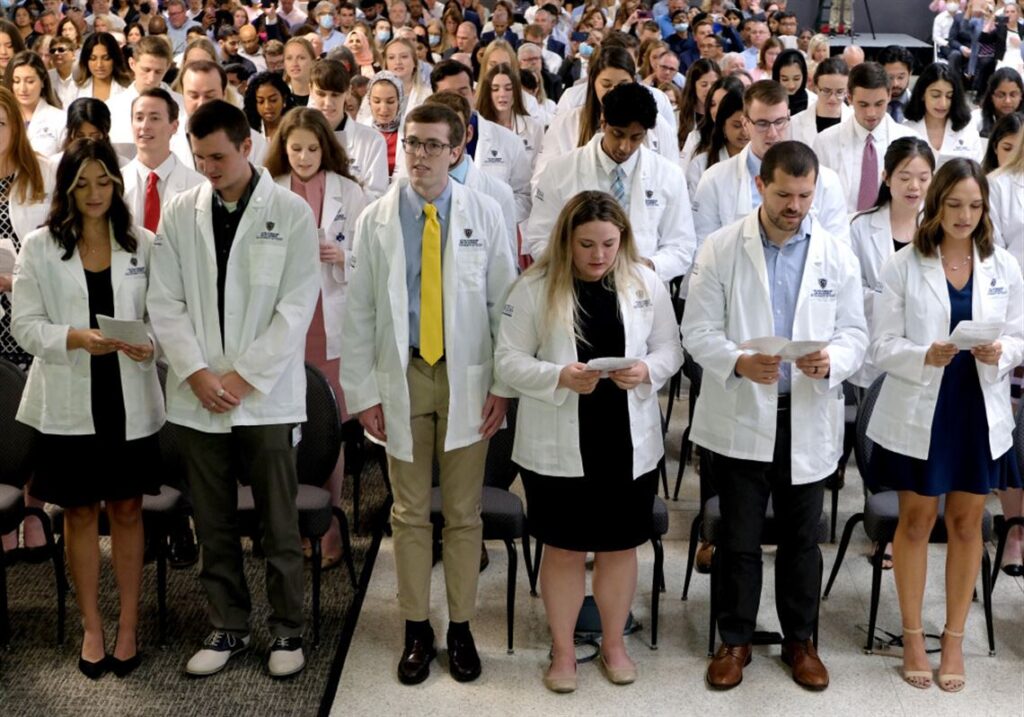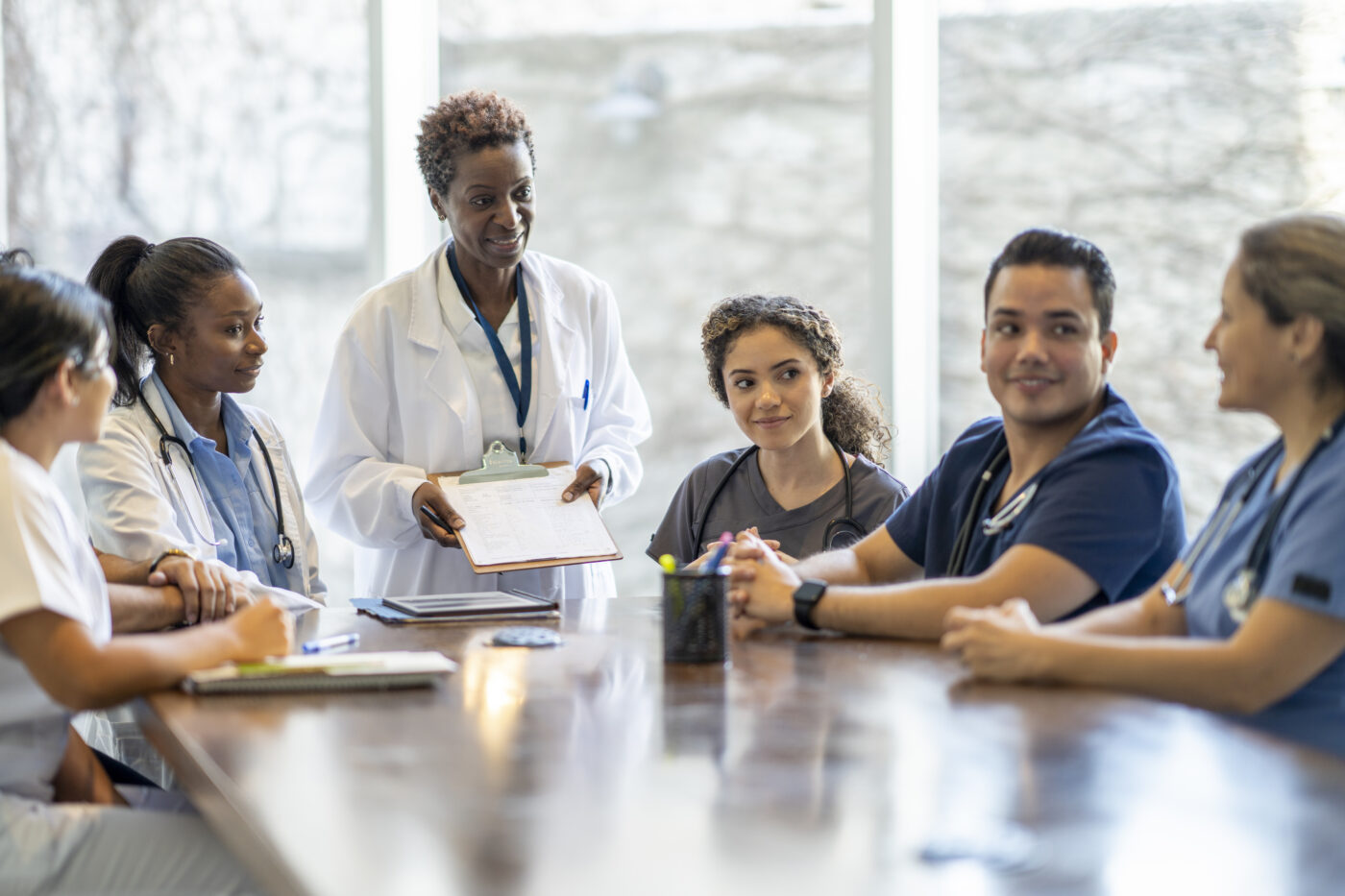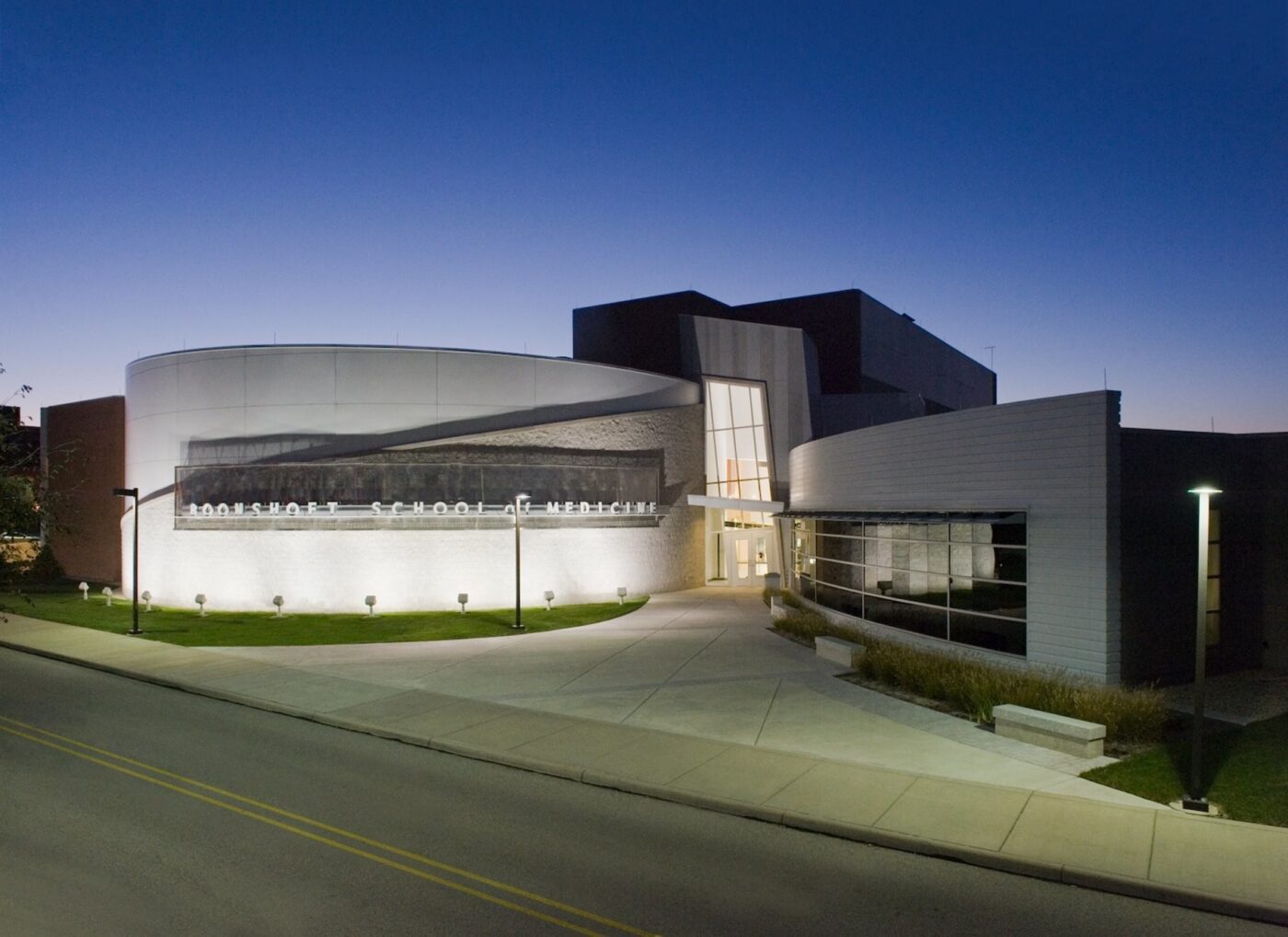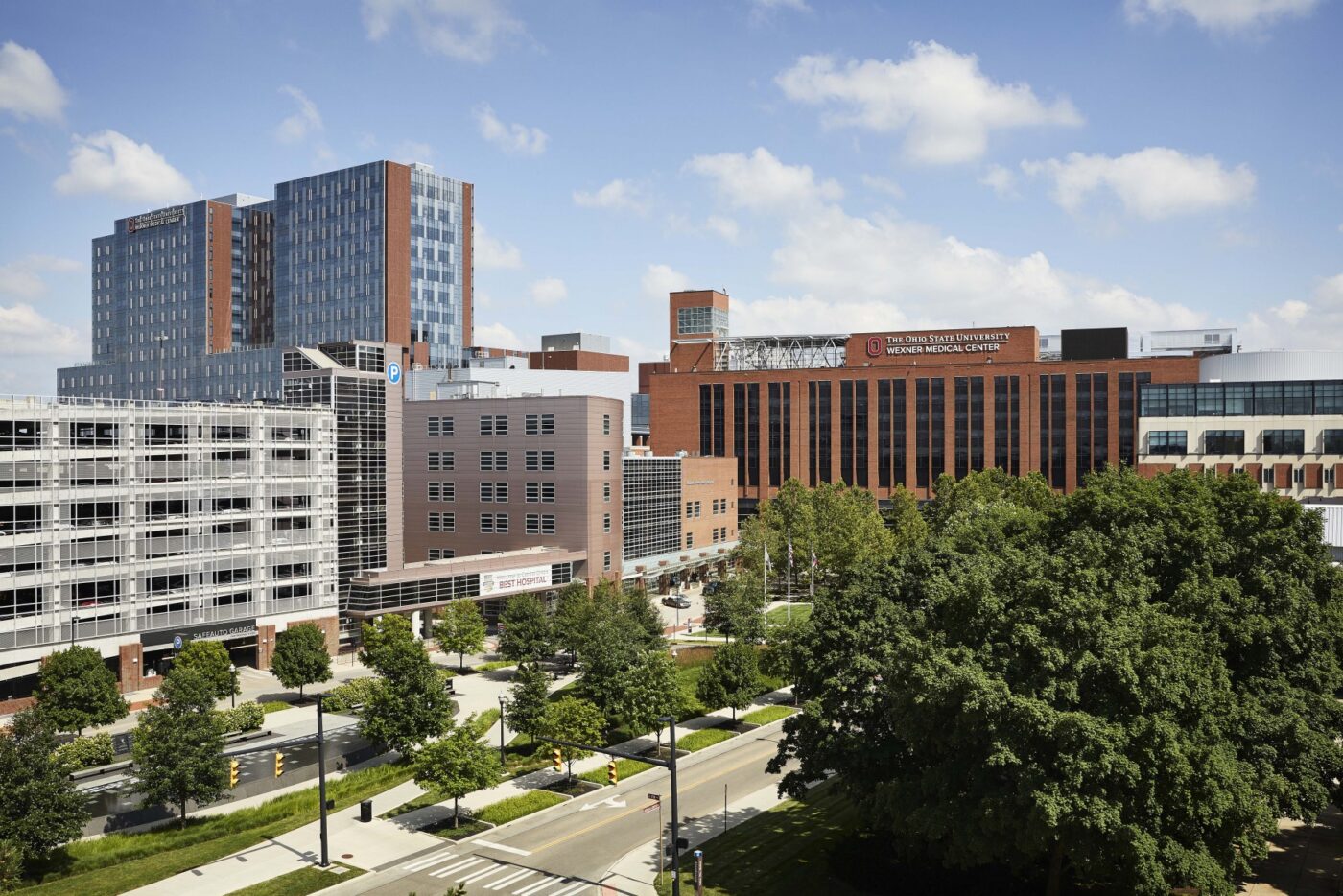Have you asked yourself “what are the best medical schools near me?” Are you looking for a reputable medical school with a dedication to its academic teachings and well-known professors? The University of Toledo College of Medicine was founded in 1964 and has been helping aspiring doctors and medical professionals attain the best education possible. The University of Toledo Medical School has many well-known professors, like Travis Taylor, PhD who is the current co-director of medical microbiology and immunology. The college is also connected to the University of Toledo Medical Center, where many of the med program students attend residency and gain clinical experience.
The acceptance rate for the University of Toledo College of Medicine is 2.62% based on the most recent class data. This acceptance rate is lower than the average med school program acceptance rate, so students who are planning to apply to the University of Toledo should curate the most competitive application possible. In this comprehensive guide, we will cover everything you need to know about applying to the University of Toledo College of Medicine. If you have been considering applying to the University of Toledo, don’t forget to bookmark this page for later reference.
Be an Informed Applicant
Like the majority of medical schools across the US, Ohio medical schools have school-specific requirements and guidelines. Gaining an understanding of a college’s identity, programs, and selection criteria will help you focus on putting your best foot forward and creating a competitive application.
This article covers:
- University of Toledo College of Medicine Rankings
- Medical Programs at the University of Toledo
- Selection Factors: What the University of Toledo Looks for in an Applicant
- Academic Requirements
- University of Toledo College of Medicine Acceptance Rate, Class Profile, and More
- UT College of Medicine Tuition and Cost of Attendance
- AMCAS Application and the University of Toledo Secondary Application
- University of Toledo College of Medicine Secondary Application: Essay Prompts, Sample Answers, and Advice
- Medical School Admissions Consulting
- Voluntary Healthcare Internships Abroad
Personalized Help
The majority of students find themselves feeling overwhelmed by medical school applications. Every school you apply to has its own admissions process. To best help you achieve your goals and get into your dream medical school, consider working with a professional admission consultant.
A medical school admissions consultant works with you to guide you through every stage of the medical school application process while providing you with personalized feedback ad support to help you succeed. International Medical Aid can help you create a competitive med school application, highlighting your strengths and tailoring your message to each school you apply to.
If you are like most pre-medical students, you will greatly benefit from IMA’s personalized medical school admissions consulting.
Why the University of Toledo College of Medicine?
In 1872, Jesup Wakeman Scott founded the University of Toledo. Initially, the school was a private trades and art school known as Toledo University of Arts and Trades. Since Jesup Wakeman Scott founded the college, it has greatly evolved. In 1904, the Toledo Manual Training School (as it had been known since 1884) was combined with another fledgling institution, the Toledo Medical College. Since 1904, the medical program at the University of Toledo has faced some hardships, including having to close the doors to its med program in 1914. Today the college has grown immensely, housing eight colleges over four campuses on more than 450 acres of land and having a student population of 20,000. The University of Toledo Medical Center is located near the college and is a popular residency choice.
University of Toledo College of Medicine Rankings
- #95 Best Medical Schools: Research
- #93 Best Medical Schools: Primary Care
- #97 Most Diverse Medical Schools
- #138 Most Graduates Practicing in Medically Underserved Areas
- #100 Most Graduates Practicing in Primary Care Fields
- #63 Most Graduates Practicing in Rural Areas
Medical Programs at the University of Toledo College of Medicine
Before you apply to a medical school, it is important to thoroughly research the different programs offered by the University of Toledo. This research will help aid in your decision about which medical school is the best fit for you and help you further focus on your application.
The University of Toledo offers a variety of degrees, including Orthopedic sciences, Medical Microbiology and Immunology, Cell and Cancer Biology, Molecular Medicine, Epidemiology, and Neurosciences.
We will be focusing on the two MD programs offered by the University of Toledo. These programs are the traditional 4-year MD program and dual degree programs.
Four-Year MD Program
The University of Toledo College of Medicine has an integrated curriculum that prepares students with skills, knowledge, and attitude to practice medicine in the supervised setting of a post-grad residency program. The college’s curriculum is split divided by pre-clinical and clinical.
Key aspects of the curriculum include:
- System-based foundational sciences
- Emphasis on clinical skills and clinical reasons during all 4 years
- Innovative educational approaches
Dual Degrees and Concentrations
The University of Toledo offers several dual degree programs, including the following options.
MD/MBA – The MD/MBA degree program helps prepare future physicians to meet the many challenges of running a practice, such as financial issues and general business admin tasks.
MD/JD – The Doctor of Medicine/Juris Doctor Program helps to prepare future physicians to handle legal issues within medical spaces. This includes hospitals, comprehensive medical centers, healthcare industries, and physician offices.
MD/PhD – The University of Toledo’s MD/PhD program aims to provide outstanding training that integrates biomedical science, clinical medicine, professionalism, and compassionate care to help students succeed as independent physician-scientists.
MD/MSBS – The MD/MSBS program is designed to help train individuals who want to perform medical research in a variety of medical sciences.
MD/MPH – An MD/MPH degree program seeks to focus on the professional practice of medicine in both a traditional patient setting and in the broader population health context.
Selection Factors: What the University of Toledo College of Medicine Looks for in an Applicant
What exactly is the University of Toledo College of Medicine looking for in medical program candidates—MCAT scores, internships, and grades?
Most colleges in the United States take a holistic review approach when looking over incoming applications. A holistic review approach means the committee reviews the entirety of your application and tries to get the big picture image of who you are as a candidate and as a person. The AAMC Core Competencies for Entering Medical Students serves as a guide during the application review process.
If you want to be accepted into the University of Toledo College of Medicine, be sure to focus on curating your application, your letters of recommendation, and completing the necessary prerequisites. Don’t be afraid to reach out and seek personalized help with your application.
Application Requirements for the University of Toledo College of Medicine
University of Toledo College of Medicine has specific academic criteria and admission requirements that med program applicants must meet in order to receive an invitation to complete the secondary application. Failure to meet the outlined requirements will result in you not receiving a secondary application.
GPA and MCAT Requirements for the University of Toledo
The University of Toledo Medical School bases MCAT and GPA requirements on the previous year’s average GPA and MCAT scores. If you want to see how your scores stack up, you should review the most recent class profile on the school’s website.
For those looking to apply for the upcoming semesters, you should review the data for the class of 2022’s profile as this is what your scores will be compared against. It is important to keep in mind that these are averages and scores both above and below these average scores can be accepted into the medical program. The entering 2022 class had an average GPA of 3.72 and an average science GPA of 3.61. The average MCAT score of the entering class was 509.
When you are applying to the University of Toledo College of Medicine, it is important to keep in mind that they accept MCAT scores no older than those taken in December 3 years prior to applying. If you are planning to or will be applying before taking your MCAT, please note this in your AMCAS application as the committee will not review your application until they have received your MCAT scores.
University of Toledo College of Medicine Letters of Recommendation
Part of being a competitive applicant at the University of Toledo includes submitting letters of recommendation with your application. The letters of recommendation you submit should be compelling and demonstrate your potential for success in the medical profession.
Letters of recommendation should be written by individuals you trust and those who can accurately portray your resiliency, interpersonal skills, your integrity, interest in medicine, and academic ability. The University of Toledo recommends that your letters of recommendation should be written by faculty members who you have studied with or a premedical advisory committee. The college strongly discourages applicants from submitting letters of recommendation written by family and friends. The college requires a minimum of 3 letters of recommendation which must be submitted via AMCAS. Letters submitted directly to the college will not be considered or reviewed by the committee, and an applicant should submit no more than 6 letters of recommendation.
Required Coursework for the University of Toledo College of Medicine
The following premedical coursework is required and must be completed at an accredited institution. Applicants are not required to complete their degree prior to applying, but a strong application takes precedence over an early application It is best to wait until you’ve received your grade in each course before submitting your application.
Here is the list of all the required coursework provided by the UToledo College of Medicine’s website.
Biological Sciences – One semester
Biochemistry – One semester
General Chemistry – One year with labs
Organic Chemistry – One year with labs
Physics – One year
Additional Recommend Coursework
These classes are not required to be accepted into the medical program at the University of Toledo, but they are highly recommended by the college. Having these additional courses on your application may make you a more competitive applicant.
Here is the list of recommended additional courses provided by the college.
- Anatomy
- Biostatistics
- English
- Genetics
- Mathematics
- Medical Terminology
- Microbiology
- Physiology
- Psychology
- Social science courses
Does the University of Toledo College of Medicine Require the CASPer Exam?
The CASPer exam is an online exam required by some medical schools. The exam is designed to assess a candidate’s interpersonal and non-cognitive skills. This exam complements the traditional admissions method of a college by judging the applicant’s personal and professional competencies.
As of 2022, the CASPer exam is not a requirement for admission at the UToledo College of Medicine.
UToledo College of Medicine Acceptance Rate and Admission Statistics
The University of Toledo College of Medicine has an acceptance rate of 2.62%. Let’s take a look at the stats for the 2022 University of Toledo class.
- Out of 6,319 total applications, 1,176 were from Ohio residents and 5,138 were from non-Ohio residents
- In total, 176 students were enrolled in the University of Toledo medical program for the 2022 class year. 63% were Ohio residents.
- The gender ratio of the 2022 class is 47% male and 53% female.
The University of Toledo College of Medicine Tuition and Cost of Attendance
Aside from tuition and fees, University of Toledo students should budget for living costs, textbooks, supplies, and incidentals. The financial aid office at the college has provided the following estimated cost statistics for the 2022-2023 school year.
Non-resident students should expect a tuition cost of $65,078 per year and resident students should expect a tuition cost of $33,073.
Year 1:
- $36,930.80 for direct expenses (tuition and fees)
- $20,420.18 for indirect expenses (personal expenses, books, and transport)
- $57,350.98 total for in-state students and $89,356.66 for out-of-state students
Year 2:
- $45,841.27 for direct expenses
- $22,115.18 for indirect expenses
- $67,965.45 total for in-state students and $107,271.03 for out-of-state students
Year 3:
- $48,019.27 for direct expenses
- $28,888.08 for indirect expenses
- $76,907.35 total for in-state students and $116,381.05 for out-of-state students
Year 4:
- $48,019.27 for direct expenses
- $29,785.95 for indirect expenses
- $77,805.22 total for in-state students and $117,278.92 for out-of-state students
AMCAS Primary Application and the University of Toledo College of Medicine Secondary Application
The AMCAS is the primary application for the majority of medical schools in the US. Your primary application will be sent to every medical school that you apply to. For the University of Toledo, it takes roughly four to six weeks for your AMCAS application to be reviewed. It is important to note that while four to six weeks is the average time it takes for an applicant’s application to be reviewed, this length may be affected by a variety of factors. If you do not hear back from the University of Toledo within six weeks, do not become discouraged.
After receiving your primary application, the college will invite you to complete the college’s secondary application. All secondary applications are college specific and the secondary application includes questions that the college feels are important to determine if you are a good fit for the school.
Please note that students will not be invited to complete the University of Toledo College of Medicine’s secondary application if they do not meet the requirements outlined previously in this guide. For a refresher on what premedical coursework is required by the University of Toledo, go back to the required coursework section of this complete guide. You will also want to note if you have completed any of the recommended additional coursework.
If you need more clarification about primary and secondary applications, check out our article about understanding the differences between the two.

University of Toledo College of Medicine Secondary Application: Essay Prompts, Sample Answers, and Advice
Completing the secondary application is a crucial part of applying to medical schools. The secondary application gives students the opportunity to express their ambitions, character, motivations, and more. Remember this is your chance to show what makes you a unique candidate and sets you apart from other applicants. Here are a few tips to help you submit a successful secondary application to the University of Toledo:
- Pay close attention to the essay prompts, read the prompt carefully, and address all of the prompt’s questions in your response.
- Use concrete evidence from your extracurricular, academic, and professional experience to support your responses.
- Do not repeat information from your AMCAS application. Use the secondary application to further explain anything you feel you did not have the chance to elaborate on in your primary application and discuss new aspects of yourself that were not mentioned in the AMCAS application.
- Proofread and edit your application materials.
- Write your essays in a clear and concise way. Remove any filler, omit unnecessary information, and stay on topic.
- Consider utilizing the medical school admissions consulting service offered by International Medical Aid. We understand that writing thousands of words for your secondary essays can be time-consuming, but admission consultants can help by identifying areas of your application that can be improved upon.
For those applying to the University of Toledo College of Medicine, there are seven secondary application essay prompts. One of the prompts is optional and two only apply to some students. The essay prompts require answers ranging from 300 to 600 words.
Essay #1
One of the AAMC Core Competencies for entering medical students involves cultural competence. The competency involves several distinct domains, including:
a. Demonstrating knowledge of socio-cultural factors that affect interactions and behaviors;
b. Showing an appreciation and respect for multiple dimensions of diversity;
c. Recognizing and acting on the obligation to inform one’s own judgment;
d. Engaging diverse and competing perspectives as a resource for learning, citizenship, and work;
e. Recognizing and appropriately addressing bias in selves and others;
f. Interacting effectively with people from diverse backgrounds.
Discuss a specific experience from your life that you feel demonstrates your level of competence in one of the above domains. (Clearly indicate which of the six domains above that you are responding to.) As part of your discussion, explain how you feel this experience will impact your future contribution to the culture of diversity and inclusion at The University of Toledo College of Medicine and Life Sciences and later in your career as a physician. Max word count: 600
This essay prompt gives applicants the chance to discuss any experiences they have involving the appreciation or participation in unique, diverse cultural experiences.
Here is a sample answer:
My unique experience attending a pre-med healthcare internship abroad has aided to the core competency domain of interacting effectively with people from diverse backgrounds. During my internship, I gained clinical experience in Kenya. Working with doctors and medical professionals in Kenya required me to learn how to effectively communicate with individuals from diverse backgrounds. As I shadowed the doctors in Kenya, I had to learn how to navigate the unfamiliar culture and healthcare landscape. By interacting with the doctors and patients, I learned a wealth of knowledge about the culture (including the culture of medical care in the country).
When I first began my internship, I went into the shadowing program with the same mindset I had while in the United States clinical setting. I was shocked when this mindset and communication style set me up for failure. To succeed during the shadowing process, I had to adapt my mindset and be willing to take advice and guidance from the doctors on how to best communicate with patients. Although English is widely spoken throughout Kenya, I encountered some patients who I struggled to effectively communicate with initially due to the patients speaking the other primary language of Kenya, Swahili.
To improve my communication, I began to study and pick up Swahili. Learning keywords in this language allowed me to become far better at communicating with the patients and even some of the medical staff during my internship. The skills I learned while interning will be carried with me during my medical school career, residency, and into my medical practice. I intend to make an effort to learn the best and most effective way to communicate with those who I interact with, whether they are peers, professors, or future patients.
Essay #2
One of the AAMC Core Competencies for entering medical students involves resilience and adaptability. This competency involves the ability to tolerate stressful or changing environments or situations and adapt effectively to them. Additional characteristics of this competency are persistence and the ability to recover from setbacks.
Discuss a specific experience from your life that you feel demonstrates your level of competence in resilience and adaptability as described above. As part of your discussion, explain how you feel this experience will help you meet new challenges you may face in medical school. Max word count: 600
This is another prompt in which UToledo College of Medicine wants you to explain and demonstrate how you reflect the AAMC Core Competencies in your daily life. For this prompt, the answer options are nearly endless as any experience that portrays a time when you had to show resilience in a stressful situation can be discussed in your answer.
Here is a sample answer:
During the start of the 2020 pandemic, I faced an unforeseen and highly stressful financial crisis. In March 2020, I was attending undergrad school, working part-time, and living on my own in an apartment off campus. As businesses began to close due to government regulations, my job was no exception. The college I attended also ended classes.
Unfortunately, as a college student, I had loans to pay and minimal income. The blow of being laid off from work was harder on me than I had expected. To make ends meet, I began working odd jobs for individuals and applying to any and every open position at essential businesses. When government restrictions were lessened and businesses began to reopen, I was hit with the devastating news that my previous place of employment was closed permanently. A temporary financial hardship was quickly turning into a long-term hardship. I was facing eviction from my apartment among the stack of piling overdue bills.
I became overwhelmed, feeling that I had reached a dead end in life and worrying I would be forced to return home to live with my family who lived across the country. I made one last effort to regain my financial stability myself, I marketed my skills and made my own career. While I didn’t feel that I had many marketable skills, I began trying to find anything I could do to support myself. After a few weeks of stressing and planning, I opened my own small cleaning business. Through resilience and effective marketing and time management, I was able to begin earning a steady income and regained my stability.
Essay #3
(Optional) Please use the space below for anything you might wish to discuss related to the coronavirus (COVID-19) public health crisis. Possible topics might include, for example: your biggest lessons and insights from the pandemic; creative ways in which you were able to serve your community during the crisis; hardships you may have faced as a result of the virus or quarantine. (You will have an opportunity to specifically discuss impacts to your coursework/grades in a separate item). Max word count: 600
This essay prompt is optional but is a great opportunity to discuss how you aided the community during the pandemic and any insights you may have gained from it.
Here is a sample answer:
The COVID-19 pandemic had a profound impact on millions of people, including myself. When the pandemic began I felt that there was nothing I could do to make a difference for the community or for myself. As the country went into lockdown, I was lucky enough to have maintained my job as I was deemed an essential worker.
All around me I saw people struggling—young families, the elderly, and the ill. In my community, the biggest struggle I witnessed was high-risk individuals not being able to afford to feed themselves, whether it was because they couldn’t afford to or didn’t want to risk going to the grocery store. To give back to my community, I began meal prepping for those in my area who did not have stable access to food. Each weekend I would cook a variety of meals and supply my neighbors with enough dinners to last them for one week.
Giving back to those in my community during the pandemic solidified my choice to pursue medical school as I want to continue to give back to the community in any way that I can.
Essay #4
We invite you to briefly discuss any other connections you may have to The University of Toledo, the UToledo College of Medicine and Life Sciences, the city of Toledo, or the region of Northwest Ohio or to provide additional information about the affiliations you noted above. Max word count: 500
This prompt allows both in-state and out-of-state applicants a chance to discuss why they chose the University of Toledo. If you feel a strong connection to the state, the city, or perhaps even the faculty at the school this is a great time to discuss those connections.
Here is a sample answer:
The University of Toledo has always been my dream school. My choice to attend the University of Toledo was decided when I was a child growing up in the amazing city of Toledo. Toledo has been my home since I was born, and I can’t imagine attending medical school anywhere else.
As a child, I would go with my family to visit the Toledo Zoo and the National Museum of the Great Lakes each summer. Now, after moving out and graduating from high school, I still visit both of these locations each year. I can not fathom leaving the city to attend med school as this is where I want to set up my own practice after graduation, and I would love to study immunology under Travis Taylor PhD. Ideally, I would love to attend and graduate from the University of Toledo College of Medicine after studying immunology under the guidance of Travis Taylor PhD and then attend a residency at the University of Toledo Medical Center.
Essay #5
Will one or more years have passed between your graduation from college/university (bachelor’s degree) and your expected matriculation to medical school? YES/NO
If ‘YES’, please briefly describe what activities you are/have been engaged in during the period between undergraduate and medical school. Max word count: 300
The above prompt is not optional, but for many applicants, a further explanation will not be necessary unless you will have gap years in your education.
If you do have or plan to have a gap year in education, here is a sample answer:
Yes, I have a one-year gap in education between my undergraduate graduation and matriculation at the University of Toledo medical school. This gap year was taken purposefully to give me more hands-on real-life clinical medical field experience. After completing my undergrad, I took part in a healthcare internship abroad. The internship provided me with a wealth of knowledge and real-life experience in hospitals and clinics abroad. Since finishing the internship and returning to the United States, I have been working in a healthcare facility as an STNA gaining further medical field experience.
Essay #6
Are you a re-applicant to the MD program at The University of Toledo College of Medicine and Life Sciences?
If you indicated ‘YES,’: Please briefly describe how your application has changed since applying previously to our program. Max word count: 300
Again, this secondary application question will not require an essay response from all applicants. However, if you are a re-applicant, this is a good time to discuss how your application has changed and showcase that you are a competitive applicant.
Here is a sample answer:
As a re-applicant to the MD program at The University of Toledo College of Medicine, I have taken the time between applications to bolster my skills and improve my MCAT scores. I retook the MCAT to obtain a higher, more competitive score and have spent my time focusing on extracurricular experiences. These experiences, as you will see listed on my application, include a healthcare internship, volunteering at local medical centers, and participating in community service activities at local food banks and homeless shelters.
Essay #7
If you feel you have any aspects of your record that may potentially negatively influence your application to our medical school, we encourage you to use this space to discuss them in order to provide the admissions committee with further context about your application. (Examples of possible topics include MCAT scores lower than our class average, low grades, withdrawn course, institutional action/student conduct violation.) Max word count: 500
Applicants with low grades, MCAT scores, or other unfavorable factors on their application should use this prompt to their advantage. Use this space to thoroughly explain why these negative factors are on your application and how you have since recovered or intend to not repeat these items.
Here is a sample answer:
As my application reflects, I have a lower-than-average MCAT score. I would like to explain the circumstances behind this score and my plans for the future regarding retaking the MCAT. When I first took my MCAT, I was facing unforeseen stressful circumstances. The day prior to my scheduled MCAT I was given the news that one of my close family members had passed away. Although I had spent adequate time studying for the exam, the overwhelming grief and shock of the prior day’s news made it difficult for me to concentrate on the exam, and I feel I did not do my best. I intend to retake the MCAT and showcase my true potential at later date to achieve a more competitive score.
Medical School Admissions Consulting
At International Medical Aid, we make it a point to offer aspiring medical professionals thorough and informative content. We understand that getting into med school is hard work, and we want you to succeed during the application process.
One of the best ways to boost your medical school program application is with the expert help of an admissions consultant. Whether you need guidance writing your essays, developing an application strategy, or navigating the process, we are here to help.
We recommend taking a moment to schedule a free consultation with IMA.
Voluntary Healthcare Internships Abroad
IMA’s voluntary healthcare internships provide students with the opportunity to shadow doctors, gain valuable medical field experience, and work in hospital and clinical environments. All of the internships we offer are intensive and patient-facing. Through International Medical Aid’s pre-med shadowing study abroad programs, aspiring med students gain real-life clinical experience and become further prepared for medical school.
The internships go far beyond creating a compelling medical school application. IMA’s programs serve struggling areas and populations across the globe. By interning abroad, you can develop your doctoring skills, serve the medically underserved, and broaden your perspectives.
There is a lot to learn when it comes to our pre-med shadowing study abroad programs, so please take the time to explore the programs on our website.
Good Luck!
We want to wish you good luck as you navigate the med school application process. Remember to be strategic about your application, take your time, and do not hesitate to ask for help.
Applying for medical school programs is often a stressful and overwhelming process that is hard for new students. If you feel you may need additional help with your application, essay responses, or prepping for your upcoming semester, don’t forget to utilize IMA’s consulting services.
If you are considering applying to any other med schools in Ohio or other states, we have ultimate guides for most med schools available on our website. Whether you want to know “how medical schools stack up to other medical schools near me” or just want to check out guides for other colleges, don’t forget to check out our ultimate guides.
- Wright State University Boonshoft School of Medicine
- Ohio State University College of Medicine
- Rowan University School of Osteopathic Medicine
- Hackensack Meridian School of Medicine (HMSOM)
- Rutgers New Jersey Medical School (NJMS)
- Rutgers Robert Wood Johnson Medical School
- Cooper Medical School of Rowan University (CMSRU)
- A.T. Still University Kirksville College of Osteopathic Medicine
- Saint Louis University School of Medicine
- University of Missouri Medical School
- Kansas City University (KCU)
- UMKC School of Medicine
- New York Medical College
- University of Pittsburgh School of Medicine
- University of Wisconsin Medical School
- VCU School of Medicine
- University of Maryland School of Medicine
- Case Western Medical School
- University of North Carolina Medical School
- University of Florida Medical School
- Emory University School of Medicine
- Boston University College of Medicine
- California University of Science and Medicine
- UC San Diego Medical School
- California Northstate University College of Medicine
- Touro University of California
- CHSU College of Osteopathic Medicine
- UC Davis School of Medicine
- Harvard Medical School
- UC Riverside School of Medicine
- USC Keck School of Medicine
- UT Southwestern Medical School
- Long School of Medicine at UT Health San Antonio
- University of the Incarnate Word School of Osteopathic Medicine
- UT Austin’s Dell Medical School
- UTMB School of Medicine
- McGovern Medical School at UT Health
- Johns Hopkins School of Medicine
- McGovern Medical School at UT Health
- The University of Texas Rio Grande Valley School of Medicine
- UNT Texas College of Osteopathic Medicine
- University of Houston College of Medicine
- Texas A&M College of Medicine
- Johns Hopkins Medical School
- Baylor College of Medicine
- George Washington University School of Medicine
- Vanderbilt University School of Medicine
- St. George’s University School of Medicine
- Lake Erie College of Osteopathic Medicine (in Pennsylvania)
- Sidney Kimmel Medical College at Thomas Jefferson University
- Wake Forest University School of Medicine
- Western University of Health Sciences (in California)
- Drexel University College of Medicine
- Stritch School of Medicine at Loyola University Chicago
- Georgetown University School of Medicine
- Yale School of Medicine
- Perelman School of Medicine
- UCLA Medical School
- NYU Medical School
- Washington University School of Medicine
- Brown Medical School









